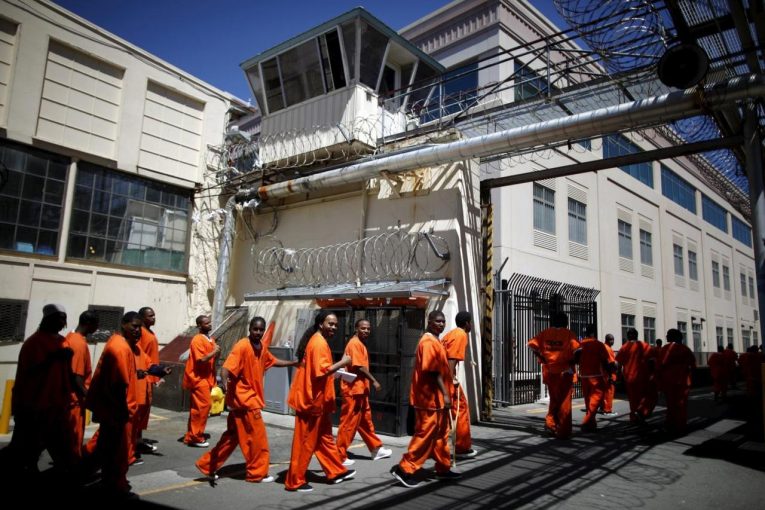
As countless Americans take to the streets in defense of Black lives and call for the transformation of policing, we must not neglect the threat that COVID-19 continues to present and the urgent need for immediate decarceration.
Nine of the nation’s 10 largest outbreak hotspots are jails and prisons. Because of deep-seated racial inequities in the justice system, failure to curb the virus’ spread through corrections facilities will lead to countless and needless deaths, disproportionately of people of color — once again demonstrating the lack of value placed on their lives. The incarceration rate of Black individuals is over five times that of white individuals, and about three in five individuals in prison are Black or Latinx — nearly double their share of the country’s population. We cannot allow over-incarceration to become a de facto death sentence for the millions — disproportionately people of color — behind bars.
The exploding outbreak within San Quentin prison demonstrates the profound danger of inaction. Two weeks ago, correctional officials were warned by experts that they needed to reduce the population in the prison by half or risk a catastrophic outbreak. They didn’t, and infections within the prison rocketed from 48 to 456. At least 1 in every 8 people incarcerated and more than 40 staff at San Quentin are now infected — an outbreak that experts say will move beyond prison walls, could overwhelm the health care system, and poses a dire threat to the entire Bay Area.
Meanwhile in state prisons and jails across the country, a pronounced lack of testing obscures the extent of the virus’ spread behind bars. As of last month, fewer than 100 people — 44 prisoners and 45 employees—had been tested for COVID-19 in Mississippi prisons and detention centers — a rate of just 0.4%. That’s unacceptable. The nearly 20,000 corrections staff and incarcerated people in Mississippi deserve better, as do their families. Failing to understand the scope of this crisis and take appropriate action puts us all at risk.

Mississippi isn’t alone in this failure. A Reuters survey found that most state prison systems — including New York, Florida, and Texas — test only symptomatic incarcerated individuals, though research shows that asymptomatic carriers can (and do) spread the virus.
Lurking behind these leadership failures is likely an alarming truth: rampant and catastrophic infection. At least 70,000 people in jails and prisons have been infected and at least 627 have died. In Ohio, nearly one in four confirmed cases are connected to the state’s prison system, and 73% of incarcerated individuals at Marion Correctional Institution tested positive for the virus as of late April. In Michigan’s Lakeland Prison, 66% of the nearly 1,000 incarcerated individuals tested positive. In North Carolina’s Neuse Correctional Institution, mass testing revealed that nearly two-thirds of incarcerated individuals were infected — 98% were asymptomatic.
The ramifications for public safety and public health are acute. Jails and prisons are not closed environments, as staff members return to the broader community after their shifts each day. Indeed, regular movement into and out of jails led to a recent projection that absent significant reduction of incarcerated populations and social distancing efforts behind bars, there could be up to 100,000 additional deaths in our nation.
More testing is a critical first step, but not a solution. Although testing can uncover the scope of the problem and propel action, the number of people behind bars also must be dramatically reduced. Dense overcrowding, shared living spaces, lack of adequate health care, and limited access to hygiene products and sanitation render jails, prisons, and detention centers petri dishes for the spread of COVID-19, and make practicing social distancing impossible. In part as a result of these conditions — and despite limited testing — the rate of infection at Rikers Island is nearly four times the rate of infection in New York City, what had been the global epicenter of the COVID-19 outbreak, and nearly 20 times that of the nation.
We can release a significant number of incarcerated people without endangering public safety. Nearly 40% of those in state prisons are incarcerated without a clear rationale for how removing them from their community promotes public safety. And most people in jails are being held pretrial, without having been convicted of a crime, and often are in custody simply because they cannot afford bond. Indeed, in response to COVID-19, some major cities have significantly reduced arrests without experiencing a spike in crime.
Elected prosecutors nationwide, per their mandate to protect all members of the community, are reducing the influx of individuals into custody and calling for immediate reduction of custodial populations. From Mississippi to Massachusetts to Hawaii, they have also urged others to do likewise.
Although prosecutors have significantly reduced local jail populations, they have little ability to depopulate state and federal facilities where rampant outbreaks are coming to light even with limited testing. As calls for justice abound, elected leaders must do more and not settle for a state of ignorance around the scale of the virus’ spread behind bars. The death toll will not end if we refuse to acknowledge the problem and arm ourselves with needed information. Our communities are taking to the streets to demand more from us.
Scott Colom is the district attorney for the Sixteenth Circuit Court of Mississippi; Miriam Aroni Krinsky is a former federal prosecutor and the executive director of Fair and Just Prosecution, a national network of elected prosecutors working toward common-sense, compassionate criminal-justice reforms.
To sign up for our new newsletter – Everyday Injustice – https://tinyurl.com/yyultcf9

